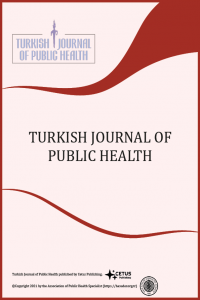Knowledge, Attitude, and Practice of Medical Students About Medical Research in Mansoura University, Egypt
Attitude, Barriers, Knowledge, Medical students, Practice
Knowledge, attitude, and practice of medical students about medical research in Mansoura University, Egypt
Attitude, Barriers, Knowledge, Medical students, Practice.,
___
- Stone C, Dogbey GY, Klenzak S, Van Fossen K, Tan B, and Brannan GD. Contemporary global perspectives of medical students on research during undergraduate medical education: a systematic literature review. Med Educ Online 2018; 23(1):537430. DOI:10.1080/10872981.2018.1537430.
- Soe HH, Than NN, Lwin H, Htay MN, Phyu KL, and Abas AL. Knowledge, attitudes, and barriers toward research: The perspectives of undergraduate medical and dental students. J Educ Health Promot 2018; 7:1-8. DOI: 10.31901/24566322.2019/25.1-3.1082.
- AlGhamdi KM, Moussa NA, AlEssa DS, AlOthimeen N, and Al-Saud AS. Perceptions, attitudes and practices toward research among senior medical students. Saudi Pharm J 2014;22(2):113-117. DOI: 10.1016/j.jsps.2013.02.006.
- Mabvuure NT. Twelve tips for introducing students to research and publishing: a medical student’s perspective. Med Teach J. 2012;34(9):705-9. DOI:10.3109/0142159X.2012.684915
- Vasilica AM, Kumar NS. Twelve tips for successfully getting involved in research as a medical student. Med Teach J. 2022;44(9):962-6.
- Abushouk AI, Hatata AN, Omran IM, Youniss MM, Elmansy KF, and Meawad AG. Attitudes and perceived barriers among medical students towards clinical research: A cross-sectional study in an Egyptian medical school. J Biomed Educ 2016;1-7.
- Amin TT, Kaliyadan F, Al Qattan EA, Al Majed MH, Al Khanjaf HS, and Mirza M. Knowledge, attitudes and barriers related to participation of medical students in research in three Arab Universities. Educ Med J 2012;4(1):47-55.
- Khan H, Khawaja MR, Waheed A, Rauf MA, and Fatmi Z. Knowledge and attitudes about health research amongst a group of Pakistani medical 393 Students’ research Turk J Public Health 2023;21(3) students. BMC Med Educ 2006;6(1):1-7. DOI:10.1186/1472-6920-6-54.
- Nel D, Burman RJ, Hoffman R, and Randera-Rees S. The attitudes of medical students to research. S Afr Med J 2014;104(1):32-36.
- Mahmud W, Haroon M, Munir A, Hyder O. Selfdirected learning and research attitudes among medical students. J Coll Physicians Surg Pak 2014;24(3):173-177.
- Mina S, Mostafa S, Albarqawi HT, Alnajjar A, Obeidat AS, Alkattan W, Abu-Zaid A. Perceived influential factors toward participation in undergraduate research activities among medical students at Alfaisal University—College of Medicine: A Saudi Arabian perspective. Med teach 2016;38:S31-S36. DOI: 10.3109/0142159X.2016.1142508.
- Becher Al-Halabi YM, Hasan M, Alkhadhari S. Extracurricular research activities among senior medical students in Kuwait: experiences, attitudes, and barriers. Adv Med Educ Pract 2014;5:95.
- Kumar J, Memon A, Kumar A, Kumari R, Kumar B, Fareed S. Barriers experienced by medical students in conducting research at undergraduate level. Cureus 2019;11(4).
- Riley SC. Student selected components (SSCs): AMEE guide no 46. Med Teach J. 20091;31(10):885-94.
- Başlangıç: 2003
- Yayıncı: Halk Sağlığı Uzmanları Derneği
Ahmet Furkan SÜNER, Ahmet Naci EMECEN, Salih KESKİN, Neslişah ŞİYVE, Ecem BAŞOĞLU ŞENSOY, Öykü TURUNÇ, Belgin ÜNAL
Early-life exposures and childhood obesity and overweight in Türkiye
Gökçesu AKŞİT, İlknur YAZICIOĞLU
A hidden burden on public health: adolescent pregnancy and increased adverse perinatal outcomes
Fatma Tuba ENGİNDENİZ, Deniz SİMSEK, Burcu DİNÇGEZ
Sara MARHOON, Miada ELMETWALY, Asmaa SAMY, Ahmed ELSAYYAD, Abdel-hady EL-GİLANY
Evaluation of infant mortality before and during COVID-19 pandemic in a district of Istanbul
Sabanur ÇAVDAR, Ayşe Zülal TOKAÇ FARIMAZ, Hüseyin KÜÇÜKALİ, Ayşe Seval PALTEKİ, Ömer ATAÇ, Osman HAYRAN
Heat-wave associated vibriosis in Russia, 2003-2021
Occupational exposure to electromagnetic fields from dental devices: A descriptive study
Ayşe BULUT, Arzu FIRLARER, Nevra KARAMÜFTÜOĞLU
Akılcı Antibiyotik Kullanımına Yönelik Eğitim programının Sağlık tekniker Adaylarına Etkisi
